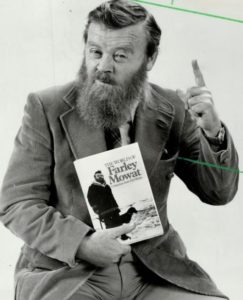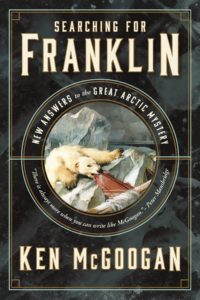Let’s Make History Exciting Again!
That’s what I heard myself saying today when Greg Marchildon interviewed me for a Champlain Society podcast.
He asked why I had called Searching for Franklin my most ambitious book yet. That’s all it took to got me rolling. Many people think that, as a subject area worth studying, History is in danger of disappearing — especially Canadian History, which has been losing ground to sociology and politics.

Farley Mowat wrote “Subective Nonfiction”
I’m working here from my notes, but roughly speaking, I wondered: who could argue with that? I noted that, as a writer, I can’t revise any university or high school curricula, nor can I change the criteria used by arts councils to award grants. All I can do is propose that we write history differently – that we try to make it more appealing to a broad general audience and re-establish it as an important literary genre. We need to Make History Exciting Again. How do we do that? Well, I suggest that we take a Creative Nonfiction approach to writing history.
Greg recalled the old familiar tensions that exist between academic and journalistic approaches to history. Between Donald Creighton and Michael Bliss on the one hand and Pierre Berton and Peter C. Newman on the other. But he surmised, rightly, that I meant to push things still further.

Creative Nonfiction Meets History
I came clean. With this latest book, I am advocating and modeling an extension to the journalistic approach — one that accommodates some personal presence, though very little use of the pronoun “I,” and still less allusion to personal experience. It purports almost to objectivity, maintains a single point of view — third-person near-omniscient — and adheres essentially to chronology.
In Searching for Franklin, which emerges out of my years of teaching Creative Nonfiction, we find a more vivid personal presence – one that incorporates personal experience. So the Canadian precursor might be Farley Mowat, come to think of it, who wrote what he called “Subjective Nonfiction.” Mowat minus the fabrications, then. My latest also draws on fictional techniques, and so features scenes and snippets of dialogue. More than that, the book does not unfold chronologically. It eschews linearity. Instead, it intertwines story lines and shifts point of view, with some sections narrated in first person. Then we get variations on first person, as when the narrator – who sounds a lot like me – directly addresses another figure, Louie Kamookak. Occasionally, too, the narration changes from past to present tense. These shifts happen within a strictly factual historical narrative. The book shuns the predictable. And that, I think, is how we Make History Exciting Again — maybe exciting enough to keep it alive.
Towards the end of our chat, Greg mentioned that he had heard I would be heading back to the Arctic in 2024 — so evoking a different kind of excitement. In fact, I will be sailing Into the Northwest Passage with Adventure Canada next fall. If anyone wants to come with me, that travel company will be holding a draw for a voucher worth $5000 USD against the cost of the voyage. How’s that for exciting? Details coming soon to this very Blog. Meanwhile, Greg Marchildon orchestrated one heckuva podcast for the Champlain Society, if I do say so as a participant. When it hits cyberspace in three weeks or so, better believe I will let you know!